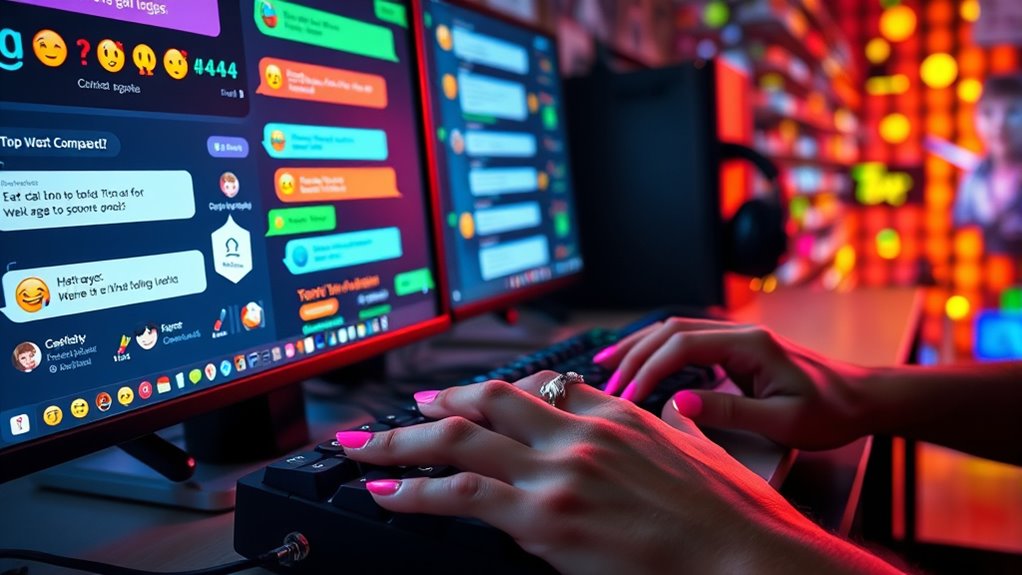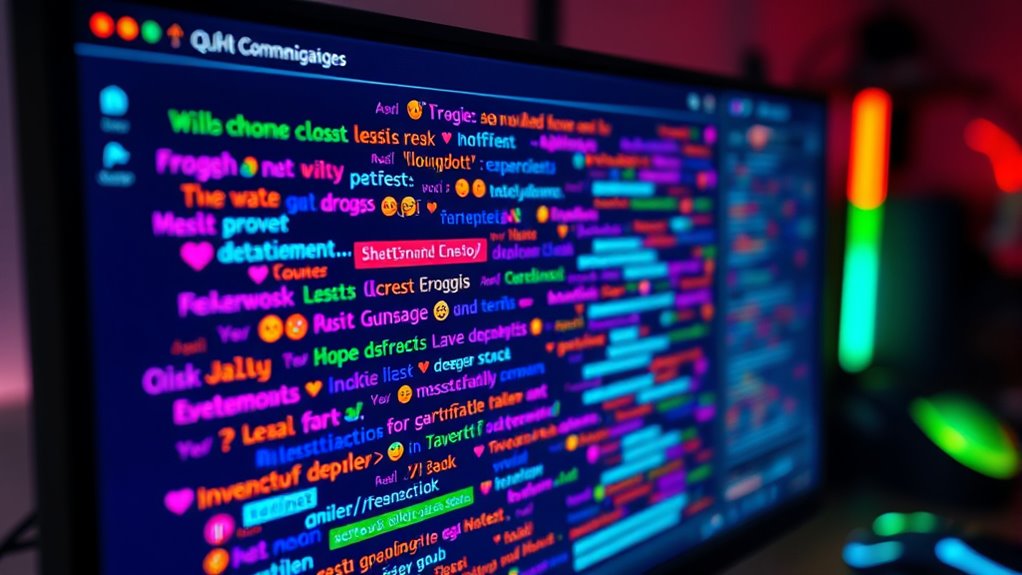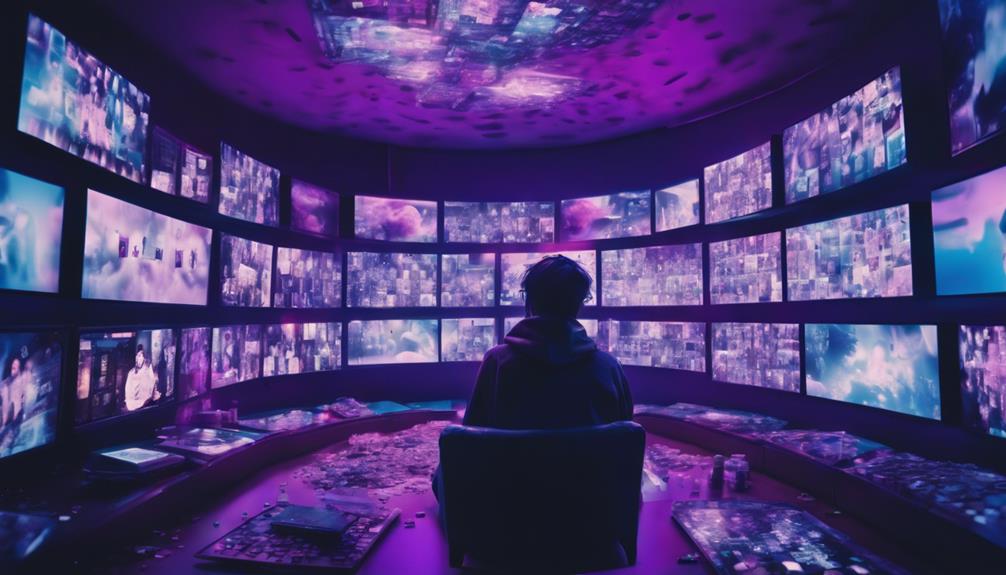Online gaming creates new hybrid languages called digital pidgins by blending slang, abbreviations, emojis, and symbols, allowing players from different backgrounds to communicate quickly and effectively. These languages evolve through collaboration, sharing memes, inside jokes, and cultural references, reinforcing community bonds and identity. As players innovate and adapt constantly, these pidgins become dynamic and unique. If you’d like to understand how these languages shape online communities, there’s more to explore below.
Key Takeaways
- Online gaming fosters the development of hybrid languages by blending native languages, slang, and digital shorthand for quick communication.
- Players collaboratively create and evolve shared vocabularies, incorporating memes, abbreviations, emojis, and inside jokes.
- Digital pidgins enhance group identity, reinforcing community bonds through unique, community-specific language.
- The fast-paced environment drives continuous linguistic innovation, with players actively shaping new expressions.
- These hybrid languages serve as living cultural tools, reflecting collective experiences and facilitating efficient online interaction.

Have you ever wondered how new online communities develop their own unique ways of communicating? When you step into the world of online gaming, you quickly realize that players aren’t just exchanging strategies or chatting about game updates—they’re creating entire new languages. This phenomenon is a prime example of linguistic innovation, where players blend elements from different languages, slang, and digital shorthand to craft a shared mode of expression. These hybrid languages, often called digital pidgins, emerge out of necessity and creativity, serving as tools to facilitate quick communication, reinforce group identity, and establish in-group status. As players from diverse backgrounds come together, they borrow and adapt words, phrases, and symbols, resulting in a language that’s dynamic and constantly evolving.
The process of developing these new languages is deeply rooted in cultural exchange. When you join an online gaming community, you’re not just participating in a game; you’re becoming part of a cultural mosaic. Players from different countries, social backgrounds, and linguistic traditions interact daily, sharing colloquialisms, memes, and slang. Over time, this exchange leads to the formation of a shared vocabulary that bridges linguistic differences. For example, players might incorporate abbreviations like “gg” for “good game,” or adapt words from their native languages into the chat, creating a rich tapestry of expression. This linguistic blending fosters a sense of belonging and camaraderie, as members feel connected through their shared language that’s distinct from conventional speech.
Moreover, these digital pidgins often incorporate symbols, emojis, and internet slang, making communication even more expressive and nuanced. The rapid pace of online interactions encourages players to develop concise and inventive ways of conveying complex emotions or reactions. This continual innovation keeps the language fresh, adapting to new trends, game updates, and community inside jokes. As a result, new words and expressions constantly surface, making the community’s language unique to its members and resistant to outside influence. Additionally, digital language evolution is accelerated by the collaborative nature of gaming, where players actively contribute to shaping and refining their shared vocabulary.
In essence, online gaming communities serve as living laboratories for linguistic innovation and cultural exchange. They’re creating languages that reflect their collective identity, shaped by shared experiences and digital creativity. These hybrid languages not only facilitate efficient communication but also strengthen social bonds among players. So, next time you jump into a game chat, pay attention to the unique slang and symbols—you’re witnessing the birth of a digital pidgin, a vibrant *testament* to how language evolves in the digital age.
Frequently Asked Questions
How Do Digital Pidgins Evolve Over Time?
You see, digital pidgins evolve over time through constant linguistic innovation and social adaptation. As players communicate, they create new slang, abbreviations, and hybrid expressions that reflect their shared experiences. This process speeds up with online gaming’s rapid interactions, allowing language to adapt quickly. Over time, these hybrid languages become more complex, blending elements from different cultures and communities, showcasing how dynamic and flexible digital communication can be.
Are Digital Pidgins Considered Legitimate Languages?
You might wonder if digital pidgins qualify as legitimate languages. Their linguistic legitimacy is debated because they evolve rapidly, blending slang, abbreviations, and symbols unique to online communities. While some argue they’re informal, others see them as valid forms of communication, challenging traditional notions of language recognition. As these hybrid languages grow, their cultural significance could influence future linguistic standards, making their legitimacy a compelling and ongoing conversation.
What Role Does Technology Play in Pidgin Development?
You see, technology plays a vital role in pidgin development by driving language innovation and enabling rapid communication. Its influence fosters the creation of hybrid languages, blending elements from different tongues to suit digital contexts. As you use online platforms and gaming, you actively contribute to this process, shaping new linguistic forms that reflect technological influence, making language more adaptable and dynamic in today’s digital age.
Can Digital Pidgins Influence Mainstream Language?
Think of digital pidgins as seeds that can grow into towering trees, influencing mainstream language over time. You might not notice it, but this linguistic innovation fosters cultural integration, blending online slang and expressions into everyday speech. As these hybrid languages spread through digital platforms, they subtly reshape how you communicate, making language more dynamic and inclusive—highlighting the powerful role of online gaming and digital spaces in evolving your language landscape.
How Do Digital Pidgins Affect Cultural Identity?
You might notice that digital pidgins influence cultural identity by shaping how you express cultural identity and preserve language. These hybrid languages become a form of cultural expression, allowing communities to share unique experiences and values. While they foster connection, they can also pose challenges to language preservation, as traditional languages risk fading if digital pidgins dominate communication. Ultimately, they impact how cultures evolve and maintain their distinctiveness online.
Conclusion
As you immerse yourself in online gaming, you’re witnessing the birth of digital pidgins—hybrid languages shaped by your interactions. These new forms of communication reflect how technology transforms language itself. Isn’t it fascinating how, through play, you’re helping forge a shared linguistic identity? As these digital dialects evolve, they remind us that language is always changing, shaped by the communities that use it. So, what new words will you contribute to this virtual lexicon tomorrow?










